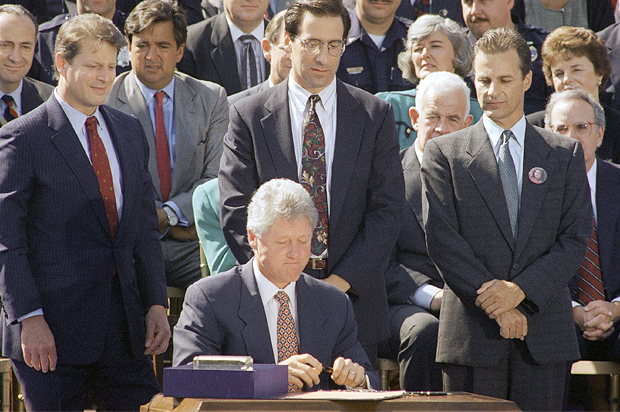Former President Bill Clinton has repeatedly defended the crime bill he signed into law in 1994, which scholars say fueled the rise of racist mass incarceration.
At a May 13 event in Paterson, New Jersey in support of his wife, the Democratic Party’s presidential front-runner, an audience member asked Clinton, “Why did you put more people in prison?”
Clinton insisted the questioner was ignorant of the legislation, pointing out that it included a provision that exempted first-time drug offenders from certain sentencing laws.
“Did you know that? I bet you didn’t,” Clinton condescendingly told the audience member, who was escorted out of the rally, Politico reported.
The former president defended the $30 billion crime bill, boasting that it put an addition 100,000 police officers on the streets and increased gun restrictions.
Activists from the Black Lives Matter movement and other anti-racist groups have repeatedly blasted the Clintons for their role in pushing these “tough-on-crime” policies, which experts say boosted the prison population, devastating millions of people’s lives and disproportionately impacting black and Latina/o Americans and the poor.
Clinton has persistently credited the legislation with creating a 25-year low in crime, 33-year low in murder and 46-year low in illegal gun deaths. While he has often repeated these talking points, nevertheless, scholars say he is wrong.
When he made similar comments in April, FactCheck.org reported that “Bill Clinton overstated the effect of the crime bill he signed in 1994.”
“Independent analyses have found that the bill had a modest effect on crime rates,” the organization noted.
At the May 13 campaign event for Hillary, Bill Clinton did admit, “We overdid the sentencing in the ‘90s. We need to reverse it,” Politico reported.
“We could not pass that bill without the higher sentencing. More than a year ago, I went to the NAACP and I said that the sentencing laws were way overdone and we needed to lower them,” he added.
Yet Clinton insisted fueling mass incarceration was a mistake, not an intended consequence of the crime bill he signed.
He then changed direction and asserted “you gotta elect a president who can get something done with Republicans.”
Hillary Clinton’s own comments suggest that Bill was misleading in his remarks. She publicly spoke enthusiastically in favor of the legislation at the time, as BuzzFeed has documented, emphasizing that the bill would crack down on crime and increase funding for prisons.
“We will be able to say, loudly and clearly, that for repeat, violent, criminal offenders — three strikes and you’re out. We are tired of putting you back in through the revolving door,” the then-first lady declared in 1994.
Clinton said the crime bill “would have put more police on the street, would have locked up violent offenders so they could never get out again, … would have given more prison construction money available to the states as well as the federal government.”
She stressed that “there are many dollars in the crime bill to build more prisons,” calling the legislation “both smart and tough.”
Later, in 1996, Clinton would use racially coded language to defend the “tough-on-crime” policies she backed. She warned, “They are not just gangs of kids anymore,” instead maintaining, “They are often the kinds of kids that are called ‘super-predators.’ No conscience, no empathy. We can talk about why they ended up that way, but first we have to bring them to heel.”
Black Lives Matter activists have frequently reminded Clinton of her racist comments.
In response to the pressure, Hillary has apologized for her role in pushing for the bill. On the campaign trail, she has admitted that she helped fuel mass incarceration. Bill, however, has been more adamant in defending his actions.
Renowned legal scholar Michelle Alexander has accused the Clintons of “decimat[ing] black America.”
“Bill Clinton presided over the largest increase in federal and state prison inmates of any president in American history,” she has stressed, and his policies escalated the War on Drugs “beyond what many conservatives had imagined possible.”
Alexander noted that Clinton “supported the 100-to-1 sentencing disparity for crack versus powder cocaine, which produced staggering racial injustice in sentencing and boosted funding for drug-law enforcement.”
She also pointed out that, when President Clinton left office in 2001, the United States had the highest rate of incarceration in the world.
Prof. Alexander is one of the world’s leading experts on mass incarceration. Her award-winning book “The New Jim Crow: Mass Incarceration in the Age of Colorblindness,” details how, “by targeting black men through the War on Drugs and decimating communities of color, the U.S. criminal justice system functions as a contemporary system of racial control, even as it formally adheres to the principle of colorblindness.”
The 2010 book argues that there has been a “rebirth of a caste-like system in the United States, one that has resulted in millions of African Americans locked behind bars and then relegated to a permanent second-class status — denied the very rights supposedly won in the Civil Rights Movement.”
FactCheck.org has criticized both the Clintons and their critics of misrepresenting the effects of the Violent Crime Control and Law Enforcement Act of 1994. But it has also acknowledged that the legislation did indeed make mass incarceration worse.
The organization noted that, while mass incarceration began in the 1970s, before the Clinton-backed crime bill, the 1994 legislation “did create incentives for states to build prisons and increase sentences, and thereby contributed to increased incarceration.”

